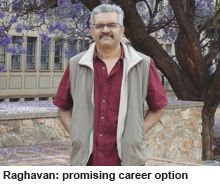Spiralling demand for criminologists
With a crime wave sweeping India, the demand for criminologists who determine the causes and effects of criminal activity and develop strategies for crime abatement, is becoming pressing, writes Indra Gidwani (Mumbai)
According to latest data of the National Crime Records Bureau — a statistical unit of the Union home ministry — a crime wave is sweeping India. In 2010 there were 33,335 registered cases of murder; 22,172 of rape; 38,440 kidnappings and abductions, of which 29,795 (81 per day) were of women and girls; and 40,613 molestation of women cases.
Little wonder that the demand for trained criminologists — professionals who determine the causes and effects of criminal activity with the objective of developing strategies to abate crime and rehabilitate both victims and criminals — is spiralling.
Criminology involves the study of criminal activity, socio-economic causes of crime and its consequences. Essentially criminologists are social scientists who examine society’s response to crime and suggest ways and means of crime prevention.
Professional study programmes in criminology and allied disciplines are available at the under-graduate, postgraduate, M.Phil and Ph D levels. Programmes under the criminology umbrella including forensic and social sciences are offered by University of Delhi; Tata Institute of Social Sciences, Mumbai; MS University, Tirunelveli (Tamil Nadu); Madras School of Social Work, Chennai; Sagar University, Bhopal; and Karnatak University, Dharwad. The latter two varsities also offer undergraduate courses in criminology.
Unsurprisingly, employment opportunities in this field are growing. Criminologists are employed in prisons and police departments, NGOs and social service institutes for women, juvenile homes, and drug and violence rehabilitation centres. NGOs are major employers as are corporates and government, apart from academic and research organisations. Fresh graduates usually begin with remuneration packages varying between Rs.10,000-40,000 per month depending on the reputation of the employer organisation. After a few years experience, pay packages can rise to six figures monthly.
 “Obviously the demand and scope for qualified criminologists in the West is greater in terms of research as well as jobs in government — child protection services, probation, police and prison departments, crime prevention units, community service and parole agencies etc. In India as well, this profession is certain to flourish with government support and dedication of individuals already committed to the profession,” predicts Vijay Raghavan, associate professor and chairperson of the Centre for Criminology and Justice at the School of Social Work of the Tata Institute of Social Sciences (TISS), Mumbai and director of Prayas, a field project of TISS.
“Obviously the demand and scope for qualified criminologists in the West is greater in terms of research as well as jobs in government — child protection services, probation, police and prison departments, crime prevention units, community service and parole agencies etc. In India as well, this profession is certain to flourish with government support and dedication of individuals already committed to the profession,” predicts Vijay Raghavan, associate professor and chairperson of the Centre for Criminology and Justice at the School of Social Work of the Tata Institute of Social Sciences (TISS), Mumbai and director of Prayas, a field project of TISS.
According to Raghavan, a growing number of youth are getting attracted to this profession although it may take a while for it to become a vocation of choice. “Because this profession is still young in India, readymade career paths are not clearly charted. But it will soon become possible to carve out meaningful careers in this field in government, academics, law firms and civil society organisations,” he says.
An idealist dedicated to serve and address the ills of society, Raghavan enroled with TISS, and equipped himself with a Masters in social work, specialising in correctional administration in 1989. After graduation, he started his career with Prayas in 1990 and worked on this project of which he was a full-time director until 2005, when he joined the TISS faculty and rose to the position of associate professor. In 2010, he was awarded a Ph D for his thesis on rising youth related extortion offences.
Under Raghavan’s stewardship, Prayas has made a significant contribution to the humanisation of India’s criminal justice system, especially in prisons, police stations, courts, legal aid organisations and women’s and children’s shelter homes, with special emphasis on protection of children’s rights and rehabilitation.
Apart from Prayas — his pet project to which he’s deeply committed — Raghavan is also heavily involved with inducting Masters students into social work, field projects in criminology and criminal justice, and undertaking research in the areas of crime, criminal justice and correction, as also with training of field staff and government officials. “Criminology took root in India as a Masters degree specialisation at TISS. However the first social science department of criminology was established in Sagar University, Bhopal. Since then several universities have started offering undergraduate and postgraduate degrees in criminology and forensic sciences,” he says.
Exhorting youth to seriously consider criminology as a post Plus Two career option, Raghavan believes the profession offers opportunity to combine idealism with a stable career. “Worldwide, considerable work is being done to prevent crime and rehabilitate victims and criminals. In India much more needs to be done. Scholars, researchers, policy makers and field staff/agencies will benefit greatly if a synergetic environment is created to devise effective solutions for ground level problems. There is need for a uniform government policy,” says Raghavan.
That’s timely advice which society can ill afford to ignore.
















Add comment